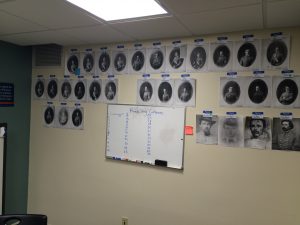Over the course of our first week, we read a number of texts and had multiple conversations which attempted to define digital humanities. Part of the definition’s complexity is due to the fact that work in the digital humanities is simultaneously individual and collaborative. The digital humanities are inherently creative—they are exciting because an individual has the opportunity to transform traditional scholarship of their choosing into something new and unique through an array of digital tools. Consequently, there is a personal aspect to each project because it reflects the values and imagination of the individual. Yet, the digital humanities are bonded together by multiple networks which are necessary for the individual to succeed. The sharing of ideas and knowledge from people at all levels of experience is crucial to the success of a digital humanities project. Additionally, digital humanities projects are meant to be publicly shared and distributed to enhance people’s knowledge and build communities. Each interaction between the individual and community results in a distinctive project, and the number and variety of projects seemingly hinders a single definition. However, I believe that the digital humanities all attempt to present scholarship from various fields in a creative, open, and engaging way through the use of digital tools and collaborative efforts.
I plan to apply my definition of digital humanities to my project this summer. It is important to me that my project represents my personal voice and imagination, while also highlighting and enlivening the work and experiences of others. My personal desire to involve myself in student led social justice movements inspired my project. It is my goal to transform traditional scholarship (found in the form of archival material and secondary sources) into a story that engages other college students and challenges them to think critically about their own position and potential with regard to the social movements happening on their campuses. I know that this goal can only happen if I have other people’s help and input—this includes the other fellows in my cohort, who will be able to share their successes, failures, and experiences with me, just as I share mine with them, and the team of librarians and digital experts, who can offer guidance and help based on their experience. The other community I hope to reach out to is those people who were or are actively involved with social justice at Gettysburg. Humanities and scholarship are not limited to textbooks; rather, they can be found in the personal anecdotes people share and representations of their lives. As such, I aim to digitize people’s stories in a way that feels immersive and authentic to allow people to learn from each other in addition to hard facts. If my project succeeds, it will be an immersive digital storytelling that conveys my own passion for social justice, while actively featuring the voices of those who brought about social change at Gettysburg College and building off of the advice and input of the Digital Scholarship Summer Fellowship team.
-Lauren

